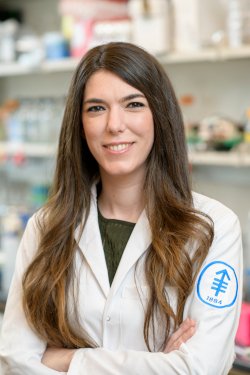Direna Alonso Curbelo
2021 Regional Award Winner — Post-Doc

Current Position:
Postdoctoral Researcher
Institution:
Memorial Sloan Kettering Cancer Center
Discipline:
Molecular & Cellular Biology

Current Position:
Postdoctoral Researcher
Institution:
Memorial Sloan Kettering Cancer Center
Discipline:
Molecular & Cellular Biology
Recognized for: Cancer commonly arises in damaged tissues and is often referred to as a “wound that never heals.” Cancer biologist Direna Alonso-Curbelo investigates the similarities and differences between wound healing and tumor development to better understand the initiating events of cancer. By comparing the responses to tissue damage of normal cells and those harboring a cancer-initiating mutation, Alonso-Curbelo discovered a mechanism that explains how the most common gene mutation that causes pancreatic cancer co-opts otherwise reparative processes to fuel tumor initiation. This discovery uncovers fundamental knowledge on the complex interactions between environmental and genetic risk factors that contribute to disease, and paves the way for the earlier detection and treatment of cancer.
Areas of Research Interest and Expertise: Cancer, Molecular Biology, Epigenetics, Inflammation.
Previous Positions:
BSc, Complutense University of Madrid, Spain
PhD, Spanish National Cancer Research Center, Spain (Advisor: Dr. María S. Soengas)
Visiting Graduate Student, Netherlands Cancer Institute, The Netherlands (Advisor: Dr. Reuven Agami)
Visiting Graduate Student, Memorial Sloan Kettering Cancer Center (Advisor: Dr. Johanna Joyce)
Postdoctoral Researcher, Memorial Sloan Kettering Cancer Center (Advisor: Dr. Scott W. Lowe)
Future Position:
Group Leader, Institute for Research in Biomedicine – Barcelona (starts Fall 2021)
Research Summary:
Complex interactions between genetic mutations and the body’s molecular environment can trigger cellular changes that lead to cancer. Paradoxically, these changes appear similar to that of wound healing processes. Direna Alonso-Curbelo, PhD, studies this paradox to better understand how oncogenic mutations and aberrant inflammatory reactions cooperate to fuel tumor development. Most of our knowledge about cancer comes from studying its ‘end product’, when patients are diagnosed with advanced tumors in the clinic, which limits our capacity to understand and control the initiating events. Therefore, Alonso-Curbelo engineered novel mouse models to characterize the responses of normal cells and those yet to become malignant to tissue damage. By examining the similarities and differences between how the body repairs tissue and how cells turn cancerous, she discovered a cooperative interaction between the most prevalent gene mutation that causes pancreatic cancer and tissue damage, that fundamentally alters how cells turn on or off genes within such damaged tissue context. This interaction between genetics and the environment defines the ‘big bang’ moment that unleashes tumor development, distinguishes developing pancreatic tumors from normal, regenerating tissues, and triggers rapid activation of genes required for cancer initiation. Alonso-Curbelo’s discovery provides a deeper understanding of how pathogenic gene-environment interactions redirect otherwise reparative tissue processes towards tumor growth, and paves the way for the earlier detection and treatment of cancer.
“To fix the ending, we need to better understand the beginnings. In the lab, I put curiosity, creativity and observation into action to explore the unknowns of cancer biology. The best part is that I get to do this surrounded by so many inspiring colleagues that I’m lucky to call family”
Key Publications:
Other Honors:
| 2020 | Postdoctoral Junior Leader Award, La Caixa Foundation (Spain) |
| 2018 | Benjamin F. Trump Award for Scientific Research Excellence, Aspen Cancer Conference |
| 2016 | AACR Scholar-in-Training Award, American Association for Cancer |
| 2014 | Postdoctoral Fellowship in Life and Matter Sciences, Ramón Areces Foundation (Spain) |
| 2013 | Extraordinary Doctorate Award, Autonomous University of Madrid (Spain) |
| 2012 | National Short-Term Research Fellowship, Ministry of Science and Innovation (Spain) |
| 2010 | SMR Travel Award, Society for Melanoma Research |
| 2009 | Biomedical Sciences Schools Valedictorian Award, Complutense University of Madrid |
In the Media:
SINC (Science News Agency) – Biopic (in spanish)